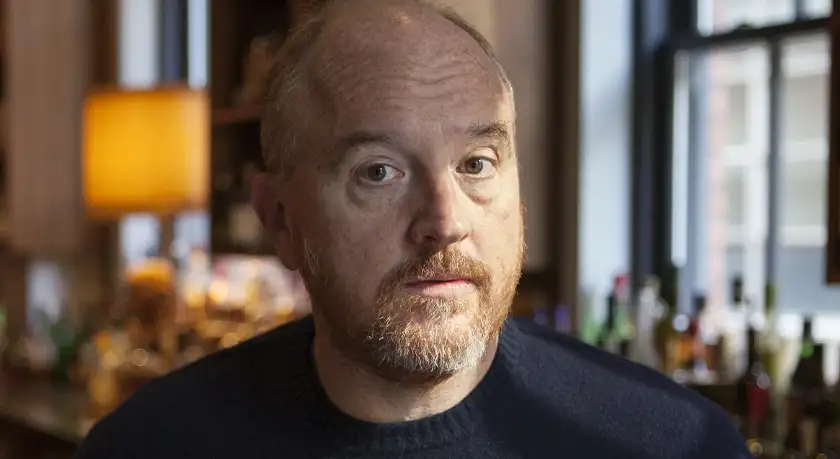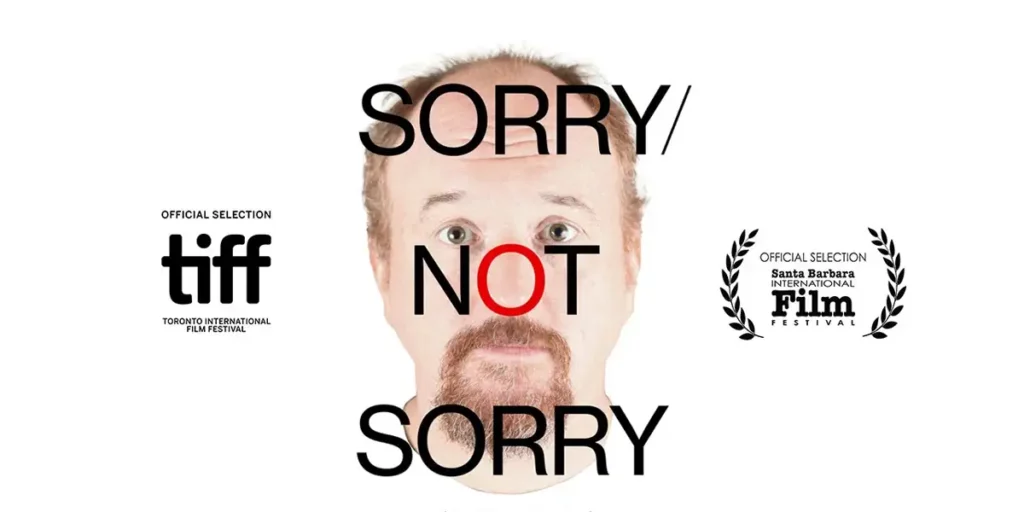Sorry/Not Sorry examines Louis CK’s misconduct, downfall, and the sociological impact of his comeback as his victims address the unseen effects of his behavior.
Directors: Cara Mones & Caroline Suh
Genre: Documentary
Run Time: 90′
US Release: July 12, 2024
UK Release: TBA
Where to watch: in select US theaters and VOD
In a most timely and relevant fashion, a new documentary smothered in celebrity sexual misconduct has hit the scene. Sorry/Not Sorry takes on the Louis CK sexual misconduct allegations and examines his very public downfall from the entertainment throne while exploring the sociological impact of his shameless comeback as his victims address the unseen effects of his behavior. Sorry/Not Sorry makes for one impactful documentary that poses some very relevant questions.
Directed by Caroline Suh (Working: What We Do All Day) and Cara Mones (producer, Norman Lear: Just Another Version of You), Sorry/Not Sorry opens with a scene from Louis CK’s comeback show of the same name, where he literally uses his sexual misconduct allegations as twisted punchlines, which the audience laps up like spilled milk. The comedian was accused by several women of sexual misbehavior, wherein he either asked their permission to pleasure himself in front of them, or he just dropped trou and gave it a go.
Louis CK’s misconduct came to public light in 2017 when, at the height of the #MeToo movement, the The New York Times published an article on the celebrated and influential comedian alleging years of sexual misconduct against numerous female comedians and colleagues. As a result, his career *seemed* to take a nose-dive. In the article’s wake, CK did come out and confirm the truth behind the allegations, but he never publicly apologized for his actions. Within nine months, he was back touring, had TV specials lined up, and—no lie—was awarded a Grammy for Best Comedy Album.
Sorry/Not Sorry takes us through the ins and outs—and even behind-the-scenes—of the entire Louis CK ordeal, from the accusations and media coverage to his public downfall and shameless comeback. Moreover, through a series of candid interviews with his victims wherein they recount their experience and how it made them feel, as well as how it impacted their lives, the documentary shines a brighter light on the sociological issues surrounding such types of misconduct in Hollywood.
“Most female comedians quit because it’s just a series of indignities they have to suffer all their lives just to get 50% of what men get,” says victim Megan Koester in response to CK’s indignities.

Additionally, Sorry/Not Sorry features interviews with the journalists who broke the Louis CK story, and with celebrities, entertainers, and cultural commentators, such as Michael Ian Black, Matt Damon, Michael Shur, Jon Stewart, and Tig Notaro, to show how Hollywood’s reaction to this scandal highlights a bigger issue at hand: the sociological impact related to such types of misbehavior.
Central to the Sorry/Not Sorry documentary is an extensive interview with Jen Kirkman, the first of the women to speak up about Louis CK’s misconduct. Her courage to revisit her experience for this film after receiving so much abuse over it makes it a most valuable watch, and it’s interesting to hear, in her own words, why she did what she did.
Suh and Mones further step out of the fray to emphasize the fact that because businesses were employing him and institutions were rewarding him, it makes women responsible for the behavior of men. And they are right.
By exploring Hollywood’s silence on the matter and questioning the roles of sex and power in the workplace, the role the public plays in these types of stories at large, and where we draw the line with what we as a culture will tolerate, Sorry/Not Sorry goes well past a simple documentary exposing a true story to become a film—a work of art, an exploration—that forces you to think about your own morality and boundaries. What, exactly, constitutes sexual harassment? Who gets to return to the public eye after the fact? How and when do we welcome perpetrators back, if we welcome them at all?
What’s horrifying is that throughout the documentary, most of the celebrities and commentators being interviewed consistently compare C.K.’s success as a comedian to the likes of Bill Cosby, which is, to me, a bit appalling. That’s not a compliment; it’s a horror. And the fact that Hollywood doesn’t see it this way is a reason why most sexual perpetrators are allowed to continue in the biz like nothing ever happened. And that’s part of Suh and Mones’ issue: People were unwilling to do anything to shame him publicly for what he’d been doing for 20 years, all because he was considered one of the biggest comedians in the world at the time.
“This has become about the silence of male comedians,” Suh said in an interview with the Daily Beast. Louis CK thought he could get away with this because he’d achieved fame and was “powerful”, and he damn near did get away with it thanks to patriarchal Hollywood’s tight-lipped reaction.
As a good documentary should do, Sorry/Not Sorry takes us deeper into the issue at hand and presents us with our own questions to explore: Where will we draw the line at second chances? Will that line have boundaries and if so, what will those look like for women versus men? It has to be drawn somewhere, and, based on Sorry/Not Sorry, in today’s culture, it seems no one cares where that line is, or even if it exists. Since Louis CK’s misconduct scandal, nose-dive, and subsequent re-acceptance and re-emergence, Suh and Mones argue that culturally, it seems nothing has changed, and the proof lies in CK’s welcomed return and promotion. Tune in and see for yourselves.
Sorry/Not Sorry will be released in theaters in NY and LA and on VOD on July 12, 2024.

